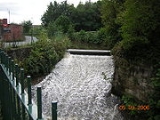
Smith and Snipes Hall Farm Ltd v River Douglas Catchment Board
Encyclopedia
Smith and Snipes Hall Farm Ltd v River Douglas Catchment Board [1949] 2 KB 500 is an English contract law
case, notable for Denning LJ's views concerning privity of contract.
and the Leeds and Liverpool Canal
) to carry out some work if some contribution to the cost was given. In 1940 Mrs S, one of the covenantees, sold her land ("Low Meadows") to Smith, which incorporated Snipes Hall Farm Ltd in 1944. In Autumn 1946 the Ellen Brook burst its banks and flooded Smith and Snipes Hall Farm land. They made a claim against the Board for damages in tort and breach of contract. The question was whether not having been privy to the original agreement was a bar to any recovery.
it could be enforced by the covenantee and successors in title. Denning LJ's notable decision went as follows.
English contract law
English contract law is a body of law regulating contracts in England and Wales. With its roots in the lex mercatoria and the activism of the judiciary during the industrial revolution, it shares a heritage with countries across the Commonwealth , and the United States...
case, notable for Denning LJ's views concerning privity of contract.
Facts
The River Douglas Catchment Board agreed with a number of landowners between the River DouglasRiver Douglas
The River Douglas, also known as the River Asland or Astland, is a river that flows through Lancashire and Greater Manchester in the north-west of England...
and the Leeds and Liverpool Canal
Leeds and Liverpool Canal
The Leeds and Liverpool Canal is a canal in Northern England, linking the cities of Leeds and Liverpool. Over a distance of , it crosses the Pennines, and includes 91 locks on the main line...
) to carry out some work if some contribution to the cost was given. In 1940 Mrs S, one of the covenantees, sold her land ("Low Meadows") to Smith, which incorporated Snipes Hall Farm Ltd in 1944. In Autumn 1946 the Ellen Brook burst its banks and flooded Smith and Snipes Hall Farm land. They made a claim against the Board for damages in tort and breach of contract. The question was whether not having been privy to the original agreement was a bar to any recovery.
Judgment
The Court of Appeal all held that the Board was in breach of contract, and that breach caused damage to the farm. The agreement showed the intention that the obligation would attach to the land, and it would not matter whose hands the land came into: the owner could enforce the covenant. Because the covenant ran with the land, under section 78 Law of Property Act 1925Law of Property Act 1925
The Law of Property Act 1925 is a statute of the United Kingdom Parliament. It forms part of an interrelated programme of legisation introduced by Lord Chancellor Lord Birkenhead between 1922 and 1925. The programme was intended to modernise the English law of real property...
it could be enforced by the covenantee and successors in title. Denning LJ's notable decision went as follows.
See also
- English contract lawEnglish contract lawEnglish contract law is a body of law regulating contracts in England and Wales. With its roots in the lex mercatoria and the activism of the judiciary during the industrial revolution, it shares a heritage with countries across the Commonwealth , and the United States...
- English property lawEnglish property lawEnglish property law refers to the law of acquisition, sharing and protection of wealth in England and Wales. Property law can refer to many things, and covers many areas. Property in land is the domain of the law of real property. The law of personal property is particularly important for...
- English tort lawEnglish tort lawEnglish tort law concerns civil wrongs, as distinguished from criminal wrongs, in the law of England and Wales. Some wrongs are the concern of the state, and so the police can enforce the law on the wrongdoers in court – in a criminal case...
- Beswick v Beswick

